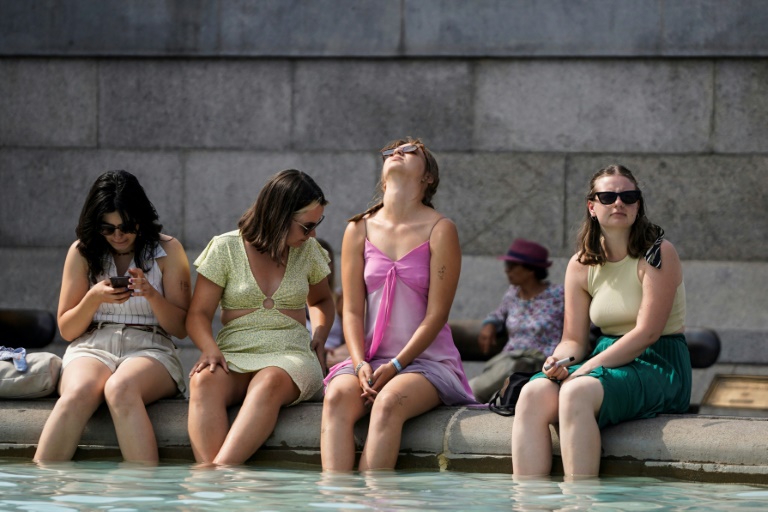Runways melted, people struggled to sleep and the queen’s guard used desk fans as they sweltered in heavy ceremonial uniforms as Britain hit record temperatures on Tuesday.
Normally chilly and often rainy in the summer, Britain this week baked under a fierce heatwave, triggering an unprecedented extreme heat alert and leaving Britons desperate to cool off.
In some parts of England, the mercury climbed above 40 degrees Celsius (104 degrees Fahrenheit) for the first time since records began.
“Everything seems to come to a grinding halt,” said retiree Bob Heathcote, 71, in the town of Worksop in central England.
Normally, he was involved in church activities, but now, he said: “People don’t feel comfortable coming out.”
Congestion was down in several cities as motorists heeded warnings to stay off the roads.
In eastern England, a section of a dual carriageway buckled, police said, leaving it looking like the humps of a skatepark.
Emergency repairs were carried out, mirroring those on runways at Luton airport north of London and the Royal Air Force base at Brize Norton.
“Defects” — widely reported as “melted” parts of the surface — forced the cancellation of flights and others to be re-rerouted on Monday.
“Infrastructure, much of it built in Victorian times, just wasn’t built to withstand this type of temperature,” admitted Transport Secretary Grant Shapps.
– ‘Worse than at home’ –
Network Rail, which is responsible for Britain’s rail infrastructure, said one stretch of track had reached a staggering 62C in eastern England.
“Rail temperature can be about 20C higher than air temperature, causing it to expand, bend and break,” it tweeted.
Passengers were told to travel only if absolutely necessary on Monday and Tuesday, with delays, cancellations and changes to services.
Trains were running at reduced speed, including on London’s underground Tube system.
The East Coast Main Line was shut completely as a precaution between London King’s Cross and York and Leeds in northern England on Tuesday.
Outside King’s Cross, US tourist Deborah Byrne was reassessing how to get to Edinburgh after being forced to stay in London for another night.
“This is our weather, with humidity, back home,” she told AFP. “So we were actually looking forward to the cool weather,” she said. “Not worse than at home — because you have no AC.”
Plenty of people were perplexed.
“I don’t know what to do,” said Jayanth Bharadwaj, a doctoral student based in Germany, who was trying to get to Cambridge. “I have to figure something out before I run out of my energy.”
Photographer Ashley Meerloo, trying to get to St Albans north of London, was also put out.
“I don’t get it,” he said. “They’ve got trains in Australia. They work. What’s the problem here?”
– ‘Just too much’ –
Health workers, too, bore the brunt across the country.
“We are seeing hospitals having to scale back the number of planned surgeries as operating theatres are too hot,” said Miriam Deakin from NHS Providers, which represents hospitals in England.
“Trusts are having to install industrial cooling units, mounting fans, and trying to cool down IT server rooms.”
Many braving the sunshine outside tried to cool off as best they could, after the hottest night on record disturbed sleep.
In central London, some dipped their feet in the fountains of Trafalgar Square or took a dip in the Serpentine in Hyde Park.
Red-faced troops, standing guard in heavy ceremonial uniforms and helmets outside Horse Guards Parade, were seen using desk fans.
Water was brought for their horses.
In parliament, the strict dress code was even relaxed, with male MPs allowed to take off their jackets.
Elsewhere, people flocked to outdoor swimming pools or to coastal resorts, as some schools closed in an early start to the summer break.
“I’ve not sleep most of the night,” complained Paul Fairweather in Worksop.
“There doesn’t seem to be any reprieve at all. It wasn’t so bad yesterday in the shade places, but today it’s just too much.”









